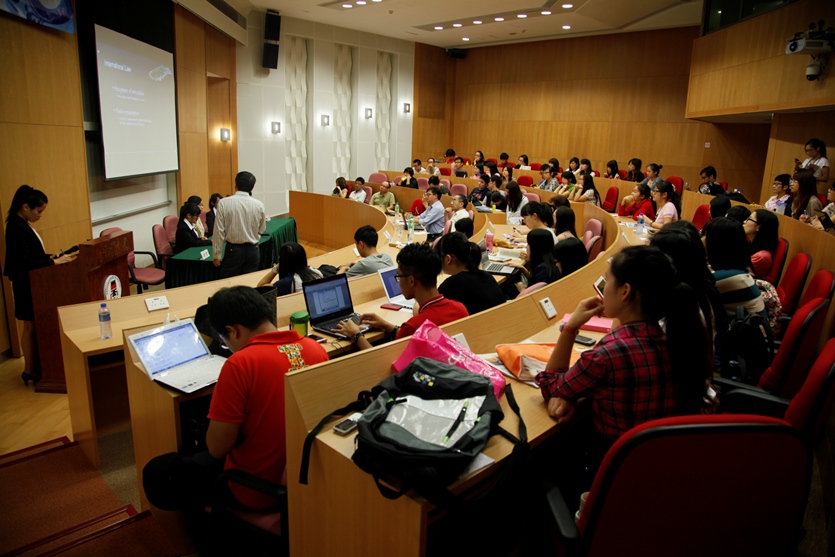On the other side of the Pacific Ocean, the U.S. presidential election debates continue to rage. The candidates’ debating skills play a crucial role in the final outcome. Here in Macao, netizens are engaged in heated discussions about hot issues. Even at UM, if you pay attention, you could always feel a culture of debate about current affairs.
Current Affairs Forums Develop Global Mindset
In response to the increasing globalization of society, UM has developed a series of globalization strategies in recent years, including enhancing students’ global mindset, knowledge and cultural competence, and encouraging students to pay attention to pressing global issues as world citizens. Recently the Youth Association of International Affairs (YAIA), which is affiliated with UM Postgraduate Association, organized an Expert Forum on Current Political Affairs, and invited staff and students to discuss the “Diaoyu Islands” issue. YAIA president Li Yi’an says that this topic was chosen because students mostly don’t know the ins and outs of the issue, and secondly because they hoped to train students’ event organization and coordination skills through the event. Every semester YAIA organizes several such forums in hopes of stimulating students’ interest in current affairs and training them to think from different angles. Topics chosen from hot international affairs are analyzed by professors from different faculties, and discussions are held between students and professors.
Similar activities are not rare to be found on campus. The Honours College Student Association (HCSA) also organizes the News Discussion Forum. HCSA president Elisa Chu says: “Future leaders should actively follow community affairs and understand community needs. Through participating in these activities, students from different faculties could hear different voices, which also make the discussion more interesting and fruitful.” HCSA organizes two to three such forums every semester. Elisa says that not only do students have the opportunity to listen to in-depth analysis by speakers, but in the process of organizing the events they also get to meet people from different walks of life and improve event organization and coordination skills, which will greatly benefit their future development.
Multi-disciplinary Knowledge Broadens Mind
In addition to these forums, there are also university debating teams in Cantonese, Mandarin and English who have been active participants in competitions at local, national and international levels. Head Coach of the Mandarin Debating Team Prof. Yin Degang from the Faculty of Social Sciences of Humanities notes: “Debating trains you to think in a systematic and holistic way. The topic of the debate is decided by drawing lots, so sometimes it doesn’t agree with the debater’s standpoint, which forces the debater to think from an entirely different angle.” He says at first, students tend to focus on debating skills, but gradually they learn how to discuss a topic in an in-depth manner and to search for solid information, especially when it comes to multi-disciplinary knowledge. “There are more and more sub-disciplines and branches of knowledge nowadays, which makes us tend to look at things in a narrow and isolated way. But it’s a complicated world, and we need to look at things from different angles and with a broader perspective.”
Fully Explore the Treasure Trove of Knowledge
Humanities knowledge, such as knowledge of philosophy and history, is indispensable for the understanding of current affairs. Luckily, getting there is made easier with the teachers’ guidance. The Pearl Jubilee College and the East Asia College also organize lectures on current and political affairs from time to time. In recent years, UM has been committed to curriculum reform in an attempt to realize whole-person education. The new education model that consists of discipline-specific education, general education, research and internship education, and community and peer education aim to help students to develop an interest in knowledge of different realms in addition to knowledge of their chosen fields. The best thing about university education is that it encourages free expression and exploration of various possibility. In the process of learning and intellectual interactions, you will make progress before you even realize it, and in time you will find that more and more doors of opportunity will open for you.

